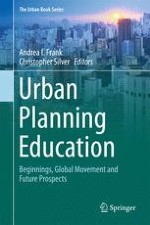2018 | OriginalPaper | Chapter
16. Envisioning the Future of Planning and Planning Education
Authors : Andrea I. Frank, Christopher Silver
Published in: Urban Planning Education
Publisher: Springer International Publishing
Activate our intelligent search to find suitable subject content or patents.
Select sections of text to find matching patents with Artificial Intelligence. powered by
Select sections of text to find additional relevant content using AI-assisted search. powered by
